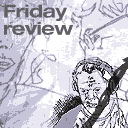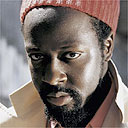
| Want to send this page or a link to a friend? Click on mail at the top of this window. |
| Posted December 1, 2003 |
 |
 |
'I preach to the streets' |
Why did Wyclef Jean help Tom Jones do hip-hop? Why has he got 62 guns? And what's he doing with 20,000 songs on a Dictaphone? Caroline Sullivan gets the answers
Friday November 28, 2003 The Guardian
'Trying to keep it sexy but spiritual': Wyclef Jean
Most rappers don't take much persuading to sing their own praises - and Wyclef Jean is no exception. He doesn't stop at telling you, face-to-face, how cool and complex he is ("My songs are so famous, they're like cover versions," he says, within moments of sitting down), he spells it out in album titles, too. His last-but-one was called The Ecleftic: 2 Sides II a Book - but why stop at two? Why not three or four?
There is, however, a fair bit of legitimacy to the former Fugee's trumpet-blowing. A self-proclaimed "modern-day Quincy Jones", Jean plays a dozen instruments and is comfortable in idioms from reggae through to jazz.
 |
| 'Trying to keep it sexy but spiritual': Wyclef Jean |
He is equally adept as an artist and a producer of others; he has his own charitable foundation dedicated to improving conditions in his native Haiti and, in person, radiates a sleepy-time foxiness. And while his albums haven't had the powerhouse sales of erstwhile colleague Lauryn Hill's solo album, The Miseducation Of, he is more prolific than either Hill or the other Fugee, Prakazrel Michel.
But the other side II the book - and this is what he wants to address with his new album, The Preacher's Son - is the critical perception of him as something of a lightweight. Essentially, it's that very "eclefticism" rebounding on him. While Hill set out her stall as a "conscious" rap queen, Jean has spent his career making music with some pretty rum characters.
He speaks fondly of "my man Bono", who has been a friend since the Fugee days, but there has also been his man Kenny Rogers, his actor man Steven Seagal (for whom he produced a reggae album) and, most controversially, his old-Lothario man Tom Jones.
Last year he orchestrated Jones's first, and presumably last, foray into hip-hop, producing and co-writing an album called Mr Jones. It flopped, and with it, according to journalist Angus Batey, went his credibility: "Wyclef's fancies have come at a cost. He's not taken seriously by critics."
But Jean is blissfully oblivious to any criticism. Exuding drowsy benevolence, he stoutly defends Mr Jones. "That was a very historical piece of work, and whoever don't got it needs to go out and get it. It's a very strong fusion of two worlds, and that marriage worked great. Whoever didn't cop that Wyclef-Tom joint needs to listen again."
Posterity may eventually come to view Mr Jones as a groundbreaking meeting of Brooklyn and Pontypridd, but the unshakeably confident Wyclef doesn't care about posterity. He's bullish about his track record, which, on his first three solo CDs, was defined by cover versions and guest stars.
A new greatest-hits album, released on the same day as The Preacher's Son, reminds us that Clef has covered the Bee Gees, Pink Floyd and lounge act the Sandpipers, as well as your cooler Bob Marley tunes. (The much-praised, 16m-selling Fugees were just as culpable, earning their biggest hit with an unadventurous version of Roberta Flack's Killing Me Softly With His Song.)
The accusation doesn't warrant so much as a shrug. He simply slouches into a more restful pose (leonine head tilted comfily, diamond-spangled hand curled around a bottle of Evian) and drawls: "People who criticise the music should pick up my new album, which is all original Wyclef bangers, no covers. I'm a modern-day Quincy Jones - I love to write, produce and perform. When I use other singers, it's because they make my songs bigger."
Yet there are signs that 33-year-old Jean - who lives, as many flush rappers do, in rural New Jersey - wants to claw back some cred. The Preacher's Son could be just the vehicle for critical rehabilitation. It is, as he says, cover-free, and the guests have been carefully chosen: Missy Elliott, rising dancehall star Wayne Wonder, ball-of-fury female rapper Rah Digga.
The balance of previous albums was always weighted toward party tunes. He may have always written commentary, along the lines of 41 Shots for Diallo, in 2000, a response to the NYPD's shooting of an unarmed street trader, but it's the wave-your-hands tunes that everybody knows and remembers.
But on The Preacher's Son, he flips that around. Jean's innate compassion and sense of justice are amped-up from the opening track - The Industry, a roll call of the many rappers who have died as a result of some testosterone-fuelled "beef".
He attributes the CD's downbeat mood to the death two years ago of his father, Gesner, a French-speaking pastor who emigrated to Brooklyn with his family in 1979. "After he died, it became a mission for me to gear the music toward a spiritual vibe. When I lost my dad, everything looked different. It's a great burden on an oldest son's shoulders." The eldest of five siblings, Wyclef was the focus of Gesner's expectations. "My dad wanted me to go to theology school, but I said: 'No, I preach to the streets.'"
Listening to hip-hop was forbidden in the Jean household, but country and jazz were allowed, from which sprang Clef's restless musical spirit. It's no exaggeration to say that music is his life. Even if the Fugees (who never officially broke up but appear no longer to exist) hadn't come along, he would have been a musician.
He says he has an archive of 20,000 songs in his studio, sung into a Dictaphone - "and the sheet music, too," he adds languidly. "Pop joints, country joints, I did a Johnny Cash tribute joint of Delia's Gone."
He is also one of hip-hop's best live performers. Whatever reservations you have about some of his frolics (such as the time he coerced Kenny Rogers into changing the lyric of The Gambler to "You've got to count your dub plates before you reach the turntable, cos if you run out of big tunes, then your sound is done"), there's no disputing his showmanship and affinity with fans.
His London gigs are particularly riotous affairs, I remark, and am rewarded with a proper beaming smile. "I'm deep in the London hood, very famous here. You've gotta have a relationship with the hood."
But how does the hood feel about his gun collection, which currently numbers 62? He simply refuses to see a conflict between "my hobby" and the death toll that guns have exacted in the rap community. In fact, he's rather indignant at the question.
"It's real simple. You have people who are collectors or do things for sport, and people who do things for violent ways. I have them for sport and collecting - doesn't mean you're going to go on the street and bang somebody up. Why would I shoot in anger? I don't resort to guns. The gist of violence in rap culture is that you gotta address the environment where someone goes into a place with a gun and shoots it up."
As quickly as he flared up, he simmers down. He doesn't want to talk about violence, he says; it spoils the mellow vibe. "I'm just trying to keep it sexy but spiritual." ·
The Preacher's Son is released this week on BMG. Wyclef Jean's Greatest Hits is out this week on Sony.
Useful links www.Wyclef.com
Lyrics to Wyclef Jean songs Buy The Preacher's Son at www.Amazon.co.uk
· Send any comments or feedback about this article to friday.review@guardian.co.uk
Guardian Unlimited © Guardian Newspapers Limited 2003. Reprinted from Guardian unlimited of November 28, 2003.
| Wehaitians.com, the scholarly journal of democracy and human rights |
| More from wehaitians.com |